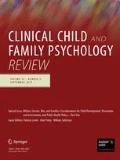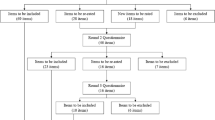Abstract
Perinatal Obsessive–Compulsive Disorder (pOCD) refers to the onset/exacerbation of Obsessive–Compulsive Disorder (OCD) during the perinatal period. This disorder has been studied in mothers, with limited research conducted on fathers. The aim of the current study was to conduct the first systematic review of research investigating the experience of pOCD in fathers. A systematic review was conducted via electronic searches of Scopus, ProQuest, APA PsychNet, PubMed, and EBSCOhost. There were 523 articles identified and screened for eligibility, resulting in six eligible studies included in the final review. All studies reported the presence of subclinical obsessive–compulsive symptoms in fathers during the perinatal period, with the prevalence comparable to mothers. Compared to mothers, however, fathers were found to report less intrusion-related distress. Two studies reported a correlation between dysfunctional beliefs, negative appraisal of intrusions, and pOCD symptoms. Common categories of obsessive thoughts and compulsions experienced by fathers were also identified. Fathers appear susceptible to pOCD, which is consistent with the Cognitive-Behavioral Theory of OCD. Future research is recommended, therefore, to investigate clinical prevalence and severity of pOCD in fathers, particularly relative to mothers, and further investigate the role of dysfunctional beliefs in the development of pOCD.

Adapted from Moher et al. (2009)
Similar content being viewed by others
References
Abramowitz, J. S., Khandker, M., Nelson, C. A., Deacon, B. J., & Rygwall, R. (2006). The role of cognitive factors in the pathogenesis of obsessive–compulsive symptoms: A prospective study. Behaviour Research and Therapy, 44(9), 1361–1374
Abramowitz, J., Moore, K., Carmin, C., Wiegartz, P. S., & Purdon, C. (2001). Acute onset of obsessive-compulsive disorder in males following childbirth. Psychosomatics, 42(5), 429–431. https://doi.org/10.1176/appi.psy.42.5.429
Abramowitz, J. S., Nelson, C. A., Rygwall, R., & Khandker, M. (2007). The cognitive mediation of obsessive-compulsive symptoms: a longitudinal study. Journal of Anxiety Disorders, 21(1), 91–104
Abramowitz, J. S., Schwartz, S. A., & Moore, K. M. (2003). Obsessional thoughts in postpartum females and their partners: Content, severity, and relationship with depression. Journal of Clinical Psychology in Medical Settings, 10(3), 157–164
Abramowitz, J. S., Taylor, S., & McKay, D. (2009). Obsessive-compulsive disorder. The Lancet, 374(9688), 491–499. https://doi.org/10.1016/S0140-6736(09)60240-3
Allen, S. M., Goldscheider, F., & Ciambrone, D. A. (1999). Gender roles, marital intimacy, and nomination of spouse as primary caregiver. The Gerontologist, 39(2), 150–158
Barrett, R., Wroe, A. L., & Challacombe, F. L. (2015). Context is everything: An investigation of responsibility beliefs and interpretations and the relationship with obsessive-compulsive symptomatology across the perinatal period. Behavioural and Cognitive Psychotherapy, 44(3), 318
Cabrera, N. J., Tamis-LeMonda, C. S., Bradley, R. H., Hofferth, S., & Lamb, M. E. (2000). Fatherhood in the twenty-first century. Child Development, 71(1), 127–136
Challacombe, F. L., Bavetta, M., & DeGiorgio, S. (2019). Intrusive thoughts in perinatal obsessive-compulsive disorder. British Medical Journal, 367, 1. https://doi.org/10.1136/bmj.l6574
Chaudron, L. H., & Nirodi, N. (2010). The obsessive–compulsive spectrum in the perinatal period: A prospective pilot study. Archives of Women’s Mental Health, 13(5), 403–410
Coelho, F. M., Silva, R. A. D., Quevedo, L. D. Á., Souza, L. D., Pinheiro, K. A., & Pinheiro, R. T. (2014). Obsessive-compulsive disorder in fathers during pregnancy and postpartum. Brazilian Journal of Psychiatry, 36(3), 272–272
Eisen, J. L., Mancebo, M. A., Pinto, A., Coles, M. E., Pagano, M. E., Stout, R., & Rasmussen, S. A. (2006). Impact of obsessive-compulsive disorder on quality of life. Comprehensive Psychiatry, 47(4), 270–275
Fairbrother, N., & Abramowitz, J. S. (2007). New parenthood as a risk factor for the development of obsessional problems. Behaviour Research and Therapy, 45(9), 2155–2163
Fisher, S. D. (2017). Paternal mental health: Why is it relevant? American Journal of Lifestyle Medicine, 11(3), 200–211
Fontenelle, L. F., Mendlowicz, M. V., & Versiani, M. (2006). The descriptive epidemiology of obsessive–compulsive disorder. Progress in Neuro-Psychopharmacology and Biological Psychiatry, 30(3), 327–337
Frías, Á., Palma, C., Barón, F., Varela, P., Álvarez, A., & Salvador, A. (2015). Obsessive-compulsive disorder in the perinatal period: Epidemiology, phenomenology, pathogenesis, and treatment. Anales De Psicología/Annals of Psychology, 31(1), 1–7
Frías, Á., Palma, C., Farriols, N., Aliaga, F., Navarro, S., & Solves, L. (2020). Parenting attitudes in people with obsessive-compulsive disorder and emotional symptoms in their children. Clinical and Health, 31(2), 91–98
Higgins, J. P., Thomas, J., Chandler, J., Cumpston, M., Li, T., Page, M. J., & Welch, W. A. (2019). Cochrane handbook for systematic reviews of interventions. Wiley.
Jacoby, R. J., Leonard, R. C., Riemann, B. C., & Abramowitz, J. S. (2014). Predictors of quality of life and functional impairment in obsessive–compulsive disorder. Comprehensive Psychiatry, 55(5), 1195–1202
Leach, L. S., Poyser, C., Cooklin, A. R., & Giallo, R. (2016). Prevalence and course of anxiety disorders (and symptom levels) in men across the perinatal period: A systematic review. Journal of Affective Disorders, 190, 675–686
Leckman, J. F., Mayes, L. C., Feldman, R., Evans, D. W., King, R. A., & Cohen, D. J. (1999). Early parental preoccupations and behaviors and their possible relationship to the symptoms of obsessive-compulsive disorder. Acta Psychiatrica Scandinavica, 100(SUPPL.396), 1–26. https://doi.org/10.1111/j.1600-0447.1999.tb10951.x
Maina, G., Albert, U., Bogetto, F., Vaschetto, P., & Ravizza, L. (1999). Recent life events and obsessive–compulsive disorder (OCD): The role of pregnancy/delivery. Psychiatry Research, 89(1), 49–58
McGuinness, M., Blissett, J., & Jones, C. (2011). OCD in the perinatal period. Behavioural and Cognitive Psychotherapy, 39, 285–310
Moher, D., Liberati, A., Tetzlaff, J., Altman, D. G., & Prisma Group. (2009). Preferred reporting items for systematic reviews and meta-analyses: The PRISMA statement. PLoS Medicine, 6(7), e1000097
Owen, M. T., Ware, A. M., & Barfoot, B. (2000). Caregiver-mother partnership behavior and the quality of caregiver-child and mother-child interactions. Early Childhood Research Quarterly, 15(3), 413–428
Paul, I., Saraf, G., Chandra, P. S., & Reddy, Y. (2020). Obsessive compulsive-disorder and reproductive life events. Asian Journal of Psychiatry, 52, 102124
Philpott, L. F., Savage, E., FitzGerald, S., & Leahy-Warren, P. (2019). Anxiety in fathers in the perinatal period: A systematic review. Midwifery, 76, 54–101
Pozza, A., Ferretti, F., & Coluccia, A. (2019). Perceived physical health in obsessive-compulsive disorder: A protocol for a systematic review and meta-analysis. British Medical Journal open, 9(6), e026261
Prospero. (2016). International prospective register of systematic reviews. University of York.
Reck, C., Struben, K., Backenstrass, M., Stefenelli, U., Reinig, K., Fuchs, T., Sohn, C., & Mundt, C. (2008). Prevalence, onset and comorbidity of postpartum anxiety and depressive disorders. Acta Psychiatrica Scandinavica, 118(6), 459–468
Salkovskis, P. M. (1985). Obsessional-compulsive problems: A cognitive-behavioural analysis. Behaviour Research and Therapy, 23(5), 571–583. https://doi.org/10.1016/0005-7967(85)90105-6
Shamseer, L., Moher, D., Clarke, M., Ghersi, D., Liberati, A., Petticrew, M., Shekelle, P., Stewart, L. A., & the PRISMA-P Group. (2015). Preferred reporting items for systematic review and meta-analysis protocols (PRISMA-P) 2015: elaboration and explanation. British Medical Journal. https://doi.org/10.1136/bmj.g7647
Speisman, B. B., Storch, E. A., & Abramowitz, J. S. (2011). Postpartum obsessive-compulsive disorder. Journal of Obstetric, Gynecologic & Neonatal Nursing, 40(6), 680–690
Stein, A., Pearson, R. M., Goodman, S. H., Rapa, E., Rahman, A., McCallum, M., Howard, L. M., & Pariante, C. M. (2014). Effects of perinatal mental disorders on the fetus and child. The Lancet, 384(9956), 1800–1819
Steketee, G., Frost, R., Bhar, S., Bouvard, M., Calamari, J., Carmin, C., Clark, D. A., Cottraux, J., Emmelkamp, P., Forrester, E., Freeston, M., Hordern, C., Janeck, A., Kyrios, M., McKay, D., Neziroglu, F., Novara, C., Pinard, G., Pollard A, C., Purdon, C., …, Yaryura-Tobias, J. (2003). Psychometric validation of the obsessive beliefs questionnaire and the interpretation of intrusions inventory: Part I. Behaviour Research and Therapy, 41(8), 863–878.
Sterne, J. A., Hernán, M. A., Reeves, B. C., Savović, J., Berkman, N. D., Viswanathan, M., Henry, D., Altman, D, G., Ansari, M, T., Boutron, I., Carpenter, J, R., Chan, A., Churchill, R., Deeks, J, J., Hróbjartsson, A., Kirkham, J., Jüni, P., Loke, Y, K., Pigott, T, D., Ramsay, C, R., …, Higgins, J, P. (2016). ROBINS-I: a tool for assessing risk of bias in non-randomised studies of interventions. British Medical Journal, 355.
Vousoura, E. (2010). Onset or exacerbation of OCD during pregnancy: Clinical characteristics and etiological considerations. Graduate Student Journal of Psychology, 12, 37–44
Wilcox, H. C., Grados, M., Samuels, J., Riddle, M. A., Bienvenu, O. J., III., Pinto, A., Cullen, B., Wang, Y., Shugart, Y. Y., Liang, K. Y., & Nestadt, G. (2008). The association between parental bonding and obsessive compulsive disorder in offspring at high familial risk. Journal of affective disorders, 111(1), 31–39
Yoshida, T., Taga, C., Matsumoto, Y., & Fukui, K. (2005). Paternal overprotection in obsessive-compulsive disorder and depression with obsessive traits. Psychiatry and Clinical Neurosciences, 59(5), 533–538
Funding
No funds, grants, or other support was received.
Author information
Authors and Affiliations
Corresponding author
Ethics declarations
Conflict of interest
The authors declare that there is no conflict of interest that could be perceived as prejudicing the impartiality of the research reported.
Additional information
Publisher's Note
Springer Nature remains neutral with regard to jurisdictional claims in published maps and institutional affiliations.
Supplementary Information
Below is the link to the electronic supplementary material.
Rights and permissions
About this article
Cite this article
Walker, R., Blackie, M. & Nedeljkovic, M. Fathers’ Experience of Perinatal Obsessive–Compulsive Symptoms: A Systematic Literature Review. Clin Child Fam Psychol Rev 24, 529–541 (2021). https://doi.org/10.1007/s10567-021-00348-2
Accepted:
Published:
Issue Date:
DOI: https://doi.org/10.1007/s10567-021-00348-2




